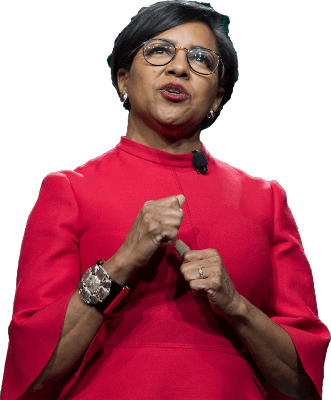It’s easy to pay lip service to diversity and inclusion. Most large organisations these days publicly acknowledge the importance of diversity and inclusion (D&I) and strive to represent themselves as welcoming to all. But words can be cheap. To actually benefit from diversity, companies need to do more than hire employees from a wide range of backgrounds. They also need to shift their company culture to get the best out of everyone.
That’s been the focus of many of Walgreens Boots Alliance’s D&I efforts over the last 18 months, according to Fiona Ibáñez-Major, WBA’s senior director, diversity, equity and inclusion, international markets. These efforts are starting to pay major dividends for the business.
Moving from high-level values to frontline action

Roz Brewer, chief executive of Walgreen Boots Alliance, is setting the tone of diversity and inclusion from the very top
“We have to set the tone from the top,” Ibáñez-Major says, pointing to the hiring in 2021 of new CEO Roz Brewer, one of only two Black women currently leading a Fortune 500 company, as one example of the company’s commitment to a diverse workforce. But just improving the diversity statistics at every level of the company isn’t enough. Ibáñez-Major believes organisations must ensure that commitment to diversity cascades down through the organisation to impact the everyday behaviour of managers.
“If we say we're committed to DE&I, and we see it as a business imperative, there's something about putting your money where your mouth is,” she says. That’s why starting in 2021 WBA made ten per cent of leaders’ bonuses dependent on meeting corporate D&I goals.
WBA is pushing to ensure that the company’s values around D&I influence behaviour throughout the organisation in other ways as well. “I think one of the things that DE&I has been guilty of perpetuating in the past is that it's somebody else's issue. The D&I team or the HR team will take care of that,” Ibáñez-Major observes.
This new approach to training pushes managers to consider: how can I start being more inclusive from today? What actions can I take to start to make a difference?
Fiona Ibáñez-Major, WBA's senior director, diversity, equality and inclusion

Fiona Ibáñez-Major, senior director at Walgreens Boots Alliance
To counteract that tendency, the company has built out its diversity training for managers. Previous training around topics such as unconscious bias was more theoretical and big picture. The new programme adds interactive workshops that focus more on inclusion in action.
“We cover key topics that probably in the past corporate environments have shied away from: things like privilege awareness and how you can then spend your privilege as an ally to show up the teams you lead,” Ibáñez-Major says.
Feedback from participants has been so positive that in the coming year WBA will work towards offering a version of the training to all team members.”When we think about systems that need breaking down, that can feel overwhelming,” Ibáñez-Major recognises. This new approach to training pushes managers to consider: how can I start being more inclusive from today? What's some action I can take to start to make a difference?”
As these changes are still being rolled out, it’s early days to discern their impact on key metrics around hiring, retention, and engagement, but Ibáñez-Major notes that the company’s annual global engagement survey includes an inclusion index that asks employees both whether they feel they can be their authentic selves at work and whether diverse perspectives are valued at the organisation.
“That's an index that is performing quite well and growing for us as an organisation,” she says.
In stores as well as at HQ
WBA’s commitment to making sure D&I isn’t just a written value but a principle in action throughout the company extends beyond how it trains managers. The company is equally keen to ensure frontline employees in stores are mindful of diversity and inclusion when dealing with customers.
Working with feedback from the company’s business resource groups (sometimes called employee resource groups at other organisations), WBA has expanded training for in-store beauty advisers to include more information on all types of skin, including skin of colour and the changing needs of women going through the menopause. Boots is also signed up to the Hidden Disabilities Sunflower scheme that provides customers who have hidden disabilities with a lanyard or badge they can wear to discreetly signal they may need additional assistance while shopping.
Signalling hidden disabilities
Boots is one of a number of employers signed up to the Hidden Disabilities Sunflower scheme. Why not check out this explainer video.
What links all these efforts is an understanding that for D&I to make an impact on the success of a business, it must move beyond words to action. And that can’t be achieved through lofty promises or well-intentioned goal-setting alone. True transformation demands concrete shifts in the ways employers are trained and incentivised.
